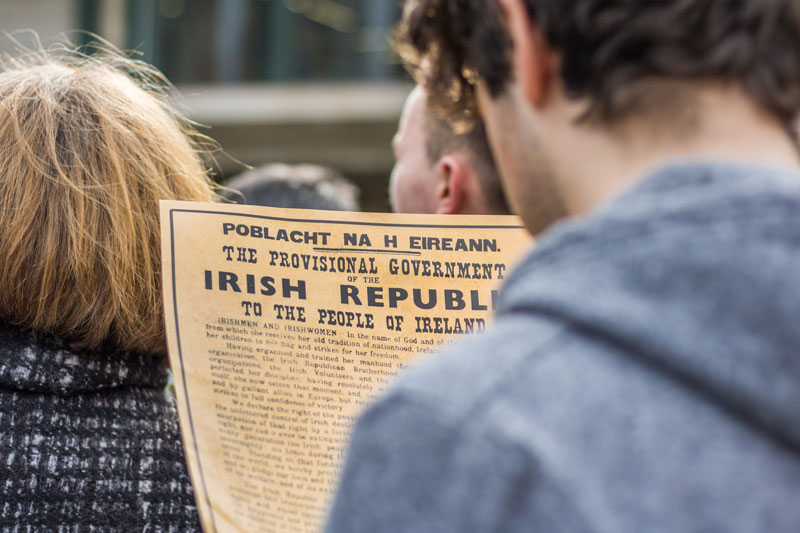Easter is over and the main commemorations of the 1916 Rising are behind us. After a flood of talks, events, parades, gatherings and media coverage, it is a relief to return to the normality of college life, busy as it is in these final weeks. That’s not to say that the events of the past five days aren’t worth lauding. Most would agree that they were a resounding success, with a huge number and variety of events held throughout the country, far surpassing the expectations of many who were perhaps sceptical earlier in the year – myself included. So why raise the topic again? There were just two areas of the celebrations that didn’t sit right with me, that I thought were worth a mention before we bring the festivities to a close for another year. The first relates to family, the second to military.
The proclamation of the Irish Republic, read by Pearse on the steps of the GPO, makes frequent reference to “the people of Ireland” – to all of us, without structure or preference. But as a descendent of one of the signatories of the proclamation, I have been invited to annual commemoratory events – including this year’s – since I was a child. But what stake in the Rising do I have that someone else does not? It is simply not compatible with the ideals of a republic that the commemoration of a core step in its foundation be celebrated in a hierarchical fashion based on family ties.
If the state wished to hold an event facilitating a gathering of relatives of those who participated in the Rising, that would be perfectly within reason. But to make them the prioritised guests for the commemoration of a movement that aimed to create a nation of equals seems bizarre and misjudged. A large number of events were open to the general public, but several of the central commemorations – such as that in the Garden of Remembrance, various receptions in Dublin Castle, and the Easter Sunday ceremony outside the GPO – involved prioritised attendance for relatives. These events were free, though based on registration, meaning that any member of the public with sufficient interest who applied on time could go. But still, places were automatically reserved for relatives who were sent invites with an RSVP request, a strange system for a celebration of a republic that guarantees “equal opportunities to all its citizens”. A cordoned-off O’Connell street brought with it a rather strange and muted atmosphere where those seated on ticketed stands watched screens showing panoramic shots of the crowds behind barriers.
The Rising of 1916 was a military one and a violent one. There is no denying that. But the decision to host a two-hour military parade as part of the central event on Easter Sunday was an odd one. Hundreds of military personnel and veterans, along with scores of army vehicles, marched through the city centre, with an amplified running narrative of each unit of soldiers and the capabilities of each vehicle or piece of weaponry. While the work of Irish peacekeepers is to be applauded, it was evident that the crowds, with the exception of some wide-eyed children, were unsure of how to react to a spectacle that would have been more at home in an American wartime movie than on the streets of neutral Ireland. Short half-hearted bursts of clapping for veterans was interspersed with long periods of near silence as tanks and armoured vehicles rolled past. It was truly a strange scene.
The parade could have been used as a creative means of listing the major moments that have shaped Irish society in the last hundred years – perhaps in the style of the ever-addictive “Reeling in the Years”. Such a parade would remind us of the difficulties of consolidating the democracy we now have, or could include the founding of the major political parties, the troubles in the North and the introduction of major legislation such as the marriage equality act. The decision instead to focus on military aspects above all seemed short-sighted, when so much of merit and worth has happened in Irish history that could have been celebrated this weekend.
While the commemorations were undoubtedly well received and exhaustive in their variety and number, it may be worth over the next century considering ways to make these tributes more inclusive and reflective of the kind of state the Rising’s participants had in mind.







